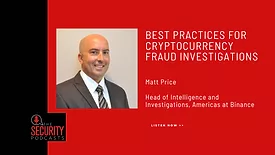Home » Keywords: » Fraud Investigations
Items Tagged with 'Fraud Investigations'
ARTICLES
Enterprise Services
Best practices for detecting and managing fraud
A look at changes in the fraud management landscape, the building blocks of a strong fraud investigation process, and what to avoid.
October 5, 2023
Best practices for cryptocurrency fraud investigations
Listen to Matt Price, Head of Intelligence and Investigations, Americas at Binance in the latest Security podcast episode.
August 24, 2022
Sign-up to receive top management & result-driven techniques in the industry.
Join over 20,000+ industry leaders who receive our premium content.
SIGN UP TODAY!Copyright ©2026. All Rights Reserved BNP Media.
Design, CMS, Hosting & Web Development :: ePublishing
.webp?height=168&t=1701459799&width=275)






